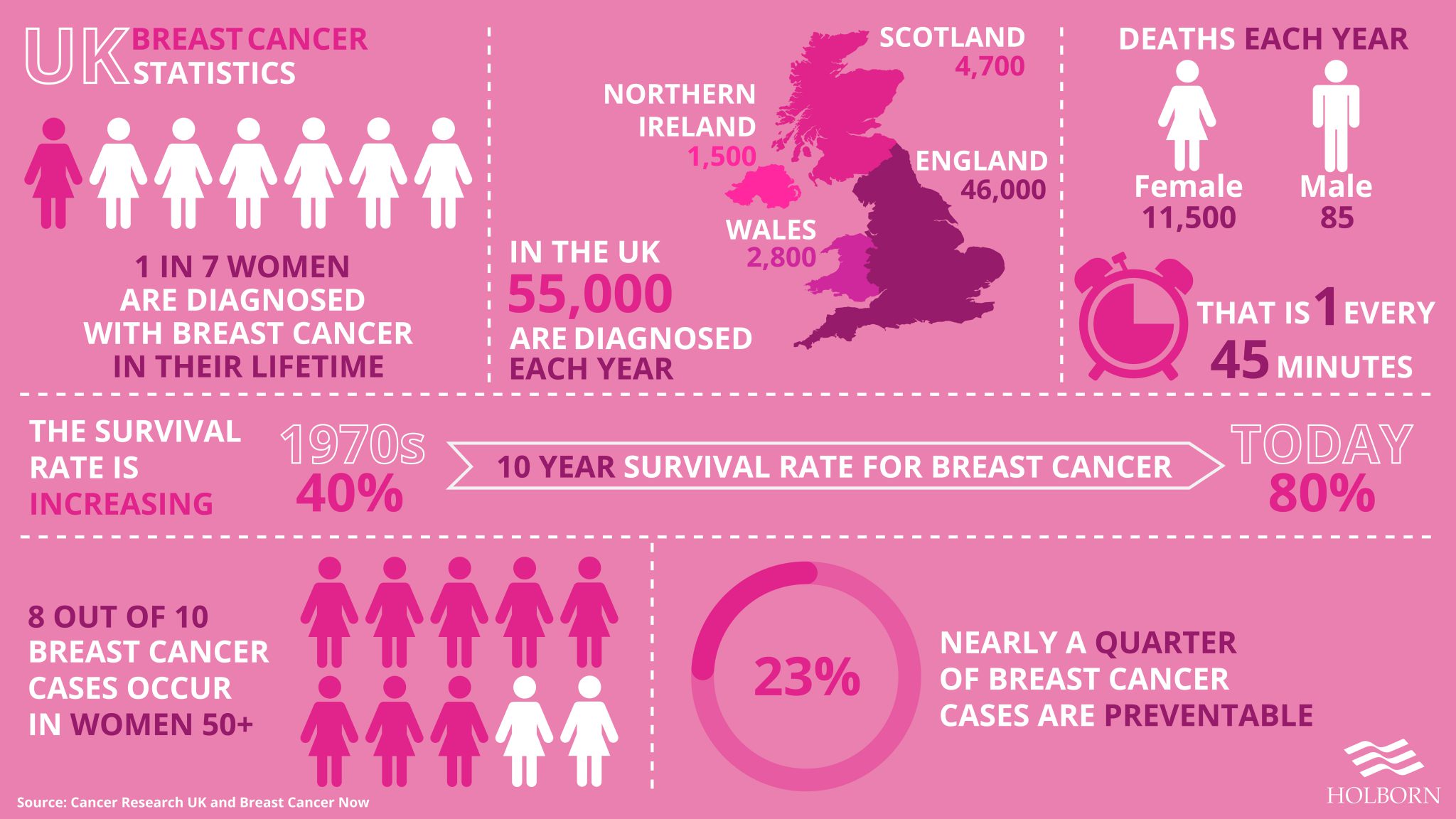Over one million women missed vital breast cancer screenings this year due to Covid-19.
Although breast cancer survival rates have doubled over the last 40 years, the pandemic has delayed referrals. Clinical trials have also been paused and made life even more challenging for those suffering from the disease.
At a time when the world’s focus is understandably on the global pandemic, breast cancer still affects around 55,000 people in the UK every year.
It’s more important now than ever before that we highlight the importance of breast cancer awareness this October. Doing so not only reminds people to donate to vital research and support services, but also spreads life-saving awareness of symptoms.
What should you look out for, and what are the symptoms?
According to recent data, breast cancer is the most common cancer for women worldwide.
Although survival rates are much higher than they used to be, particularly in women under 50, chances of recovery greatly increase if caught early enough.
Common symptoms of breast cancer can turn out to be nothing, but it’s best always to get them checked out. To help reduce your risk, make sure you:
Check your breasts, chest and underarms for changes regularly, ideally every month. The more you do it, the less scary it is. Check out this video from Coppa Feel, where they show you how to check them.
Attend breast screenings when you reach 50, at least every three years.
See your doctor if you have ONE or more symptoms, such as:
A new lump or area of thickened tissue in either breast
Change in the size or shape of one or both breasts
Discharge of fluid from either of your nipples
A lump or swelling in your armpit
Dimpling (pitting on the skin, similar to orange peel) on your breasts
Rash on or around your nipple
Change to the appearance of your nipple, such as becoming sunken into your breast
Abnormal pain in one or both breasts
Can you prevent breast cancer?
As with many other cancers, there’s a lot of debate and conflicting research as to what causes it.
It’s not possible to predict who will get breast cancer or why, but there are a few things that you can do to reduce your risk of developing the disease:
Be extra vigilant if you’re over 50. Look for symptoms and get regular breast screenings
If you have a family history of the disease, check your breasts regularly from an early age and get annual breast screenings if you can
Maintain a healthy lifestyle, keep to a healthy weight and avoid drinking alcohol or smoking excessively.

How can suffering from breast cancer affect women?
Breast cancer can impact women’s mental health in many ways, including coping with an emotional diagnosis, aggressive treatments and financial stress.
However, the less talked about symptom is the impact on those women who end up losing one or both breasts.
For some, a mastectomy is not a choice but a necessary treatment to remove cancerous tissue. But some women opt for a double mastectomy, to reduce the risk of the cancer returning, particularly if they have a family history of the disease.
If the choice is between life or keeping your breasts, it can seem like an easy decision. Still, this can be an extremely emotional choice.
It can leave women feeling robbed of their femininity, particularly if they can’t afford reconstructive surgery. Their new body shape and scars can be extremely difficult to come to terms with and a painful reminder of their treatment.
The importance of breast cancer awareness to women who’ve lost one or both breasts can make a real difference. Talking more openly about this issue can help reduce the stigma and make people more sensitive to the way they talk about breasts and the female body.
What can you do to support breast cancer awareness?
Here are some of the ways you can contribute to the fight against breast cancer:
Donate to support charities such as Macmillan Cancer Support or Breast Cancer Support
Give money to research initiatives such as
Offer help to someone you know who is suffering from cancer or their relatives
Check your breasts and encourage your friends to check theirs as well!
We hope this article has helped your understanding of how to check for symptoms and some of the current issues affecting people who have breast cancer.
We hope you’re able to donate, however big or small. Every contribution counts and can have a profound impact on someone’s life.
All information contained in this article was correct at the time of publication. This article is for informational purposes only and is not financial advice. For personal financial advice, always speak to a regulated professional.
Don’t just take our word for it...
We’re rated ‘Excellent’ on Trustpilot, based on thousands of verified reviews from real client experiences


